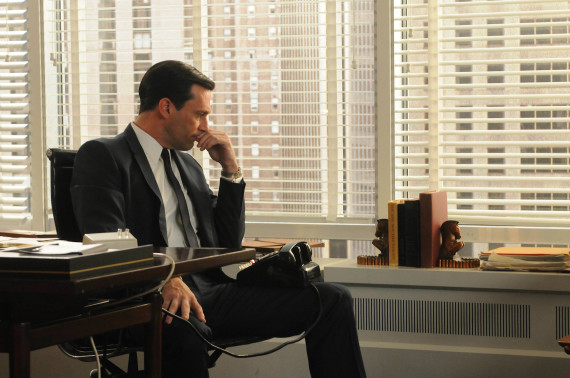Pop Chassid’s Note: I am proud and grateful to feature one of the strongest and most vocal Jewish women in media as a guest blogger. Lorelai Lehrer of Radio Free Nachlaot fame has graciously offered to write a post for Pop Chassid. Enjoy.
Recently I was in Jerusalem discussing the developments on the new (5th) season of MadMen with a friend who is similarly enamored of what arguably may be called the best show on TV (although the only way we get to see it in Israel is to download it, as with most American TV shows). The two of us – both Orthodox Jews concerned both publicly and privately with Torah, Mitzvot and Ahavat Yisroel – share a fascination with the backwards-looking series set in the 1960’s whose main character, Don Draper, after years of being the archetype of a player and the poster boy for reckless promiscuity, has suddenly found happiness (and monogamy) with his new (young) wife, Meagan.
“Have you noticed what a tzadik Don Draper has become?” my friend asked me. “Yes, it’s because he’s finally happy.” I replied. I’ve been mulling my response for a couple of days and now realize my words carry even more depth than I had intended them to.
“Who is rich?” asks the Talmud. “One who is happy with his lot.” COULD Don Draper have been happy – or even content with “his lot” when he was married to Betty and living in the idyllic suburbs of the early 1960’s with their three children? Only if he could have found a way to overlook the fact that he was carrying a guilty secret (he had stolen another man’s identity during war time so he could desert the army and start a new life) and that he was a compulsive womanizer who, by the end of Season Two, had (out of restlessness, low self esteem-based discontent and a wandering eye) slept with every woman in mid-town Manhattan and had made a serious indentation into the female demographic both Uptown, Downtown, the Village and apparently Long Island as well. In other words – chances are: NOT.
What kept Don Draper from being happy – and the reason he became happy this season – wasn’t simply that he traded up in wives. He finally found the courage to be himself – to tell the truth about himself to his new wife, to have established an island of honesty in a sea of falseness (well represented by the world of the advertising agency / business culture of the 1960’s), and to have had that truth be accepted.
Could he have told the truth about himself to Betty, his first wife? Is it possible she could have stretched beyond her shallowness and material world mentality to understand her husband, forgive him for his deception, and helped him work through the guilt and pain he felt? As the character of Betty is written, that outcome would have been doubtful. She herself was too much of a child to understand the need of her husband to reinvent himself in the light of what everyone else – most especially herself – needed him to be.
Ironically, it was only with the character of Anna Draper (who died last season), the real wife of the REAL Don Draper whose identity Dick Whitman stole after his army buddy Don Draper died during the war, who could understand Don, and make a place for him where he could be real. That place was her home in a sleepy California beachside community where “Don” could be “Dick,” relax in chinos and a T-Shirt, drink beer and work on car engines, and maintain a truly platonic brother/sister relationship with Anna, whom he both respected and cared for, out of concern for her integrity and well-being. But Don/Dick couldn’t be TRULY happy, even with Anna in California, because he was still separated from the essential truth about himself, and the rest of his life – his marriage, his children, his work and professional relationships – were all isolated fragments without connection to each other aside from the illusion which was the false identity he had created for himself.
Being REAL is what leads to true contentment and happiness. “Who is a rich man? One who is happy with his lot.” One’s “lot” is what is real in one’s life – and what is more real than to be one’s true self – faults, shortcomings, sublime moments, talents, foibles and fabulousnesses – and to be loved not just “in spite of” or “because of” but simply BECAUSE.
Nobody wants to be loved because of what they can bring to the table. Beauty fades and money can fly out the window. HaShem, the Creator of the Universe, didn’t create humans to be robots (he created angels for that!). Humans, unlike angels, have free will and can CHOOSE to love G*d (angels, on the other hand, have no free will and are only servants, programmed to obey). What good is love if it isn’t chosen – who wants the love of a robot that is compelled to love you? Love only has value when it is given freely, when it is a choice and not a compulsory response. G*d went to all the trouble of constricting Himself to make room for Creation simply because it’s both His nature to create, and His nature to want to give – as well as His nature to desire to take pleasure from His creation. How is this pleasure taken? In one way only – by the authentic response of true gratitude and thankfulness (expressed by our love for Him and devotion to all those things about Him which He chose to reveal through His Torah, nature and the world) which springs VOLUNTARILY and without coercion from the free-will choice of His creatures. That’s us, folks.
Don Draper is happy this season because he found a love that accepts him in all ways – secrets and all. Presumably by references made in the dialogue this season, new wife Meagan knows all about Don’s past, the secrets he’s kept and why, and even (to her dismay and yet to her courage) about a percentage of his past liaisons (the sheer number of which if she really had an inkling of would have her throwing more than just plates of mac and cheese at him when he comes home late).
Don Draper has found acceptance, honesty and the space to be himself and the opportunity to build a new life based on truth about who he is, and he’s found space in his newly-expanded heart to allow his wife the space to become more of who SHE is – not simply a pretty face filling a low-level creative job at his advertising agency because he loves having her at work – but an aspiring actress, something she’s dreamed of her whole life and finally had the courage to tell her husband about – risking his alienation – but succeeding because his newfound security within their relationship allowed him to be as generous in giving her space to pursue her dreams and be herself as she has been generous in accepting him for who he really is.
Now that Don is happy, he must fight for his happiness by battling his own Yetzer haRa – evil inclination – which of course there is plenty of, and all around him. Old lovers who pop up in elevators, restaurants and every time he steps foot outside his home he ignores most politely. This season had him sick with fever and after an especially unsettling encounter with an especially persistent old flame, Don literally fought for his new found happiness by strangling and killing (albeit only, thank G*d and the writers of the series, in a fever-induced dream) the one who had tempted him beyond his ability to resist. He stays close to his wife Meagan and confides in her, keeping their relationship transparent, vital and growing, in a way he was never emotionally equipped to do in his previous marriage – the weight of his own falseness denuded him of the moral strength he needed and lacked with Betty.
Even his workaholic ways have been tempered by his new-found happiness – he can admit to himself that he really isn’t that interested in what is going on at work right now, he’s more focused on his home and family life. Even though he’s showing up every day at the Agency he’s not that engaged in the work – he’s more engaged in the joy of his new marriage. The episode that opened Season 5 had his wife Meagan throwing a surprise 40th birthday party for Don in their new home and inviting his work colleagues – a huge mistake, as for Don the invasion into the island of realness he had built with Meagan by everyone from work (a place which personifies falseness to it’s core – an advertising agency) shattered his privacy and his hope of keeping his happy home an inviolate sanctuary forever.
After the party and a big fight that followed, Don begs Megan never to have his work colleagues over to their home again for a social gathering. It’s clear that in the day-to-day gashmius world of illusion, deceit and manipulation that was/is “Big Business,” Don’s only opportunity for emotional health, balance and wholeness is in his home, and he just doesn’t want it polluted.
Don’s newfound “tzadik” nature also manifests itself with unexpected emotional generosity to his colleagues (warning a discontent junior partner to appreciate what he has in his home and family and not to go wasting his life messing around with women in the city, comforting and supporting a close female friend going through a difficult time in the purest and most gentlemanly way). When a person is real, they can see where others are not allowing themselves to be real – and can give words of warning, admonition, comfort or advice to those they see going “off the derech” as only one who has lived “off the derech” can.
Don Draper – tzadik? What could be a more intriguing twist in the story – and what is more appealing than a character that struggles to overcome his dark side and comes out into the light? Don Draper, fighting the good fight against his evil inclination, triumphing even though he’s being chased by shadows – but hey, it’s a story – a TV series, for goodness sake! – And that’s what keeps it interesting.
“Who is a happy man?” asks the Talmud. “One who is happy with his lot.” The word translated “lot” (and in some translations the word “lot” is translated as the word “portion”) is from the word “Chaylek.” “Chaylek” is the Hebrew letters Chet-Lamed-Kuf, from “Chal” – what comes into and establishes itself in this world, together with “Kuf,” which represents Kedusha, that which is holy.
What is our “lot” but what comes down to us from Heaven and establishes itself into this world? What is that but our essential human-ness and our unique selves – each one made in the Image of G*d, each one imbued with individual attributes, gifts and talents? We can make what comes down (“chal”) to this world holy if we accept what comes into our lives as a gift from G*d.
We can be holy if we accept with gratitude the portion of what HaShem has given us – and what is more essential to holiness than appreciation of the very life He’s given us, our own individuality, our own uniqueness, our own personality? Denying our essential selves and the truth of who we are leads to “sheker,” falseness – and ultimately to moral and spiritual bankruptcy (as the character of Don Draper so poignantly illustrated as he danced on the precipice of those dark depths in Seasons 1-4 of MadMen, before his redemption came in the opportunity to be his real self for the first time in his adult life).
The “Kuf” in the word “Chaylek” can also be the Hebrew word for the word “monkey.” He created us each as our own special selves, and none of us to be “monkeys,” we don’t need to mimic or pretend to be someone or something that we’re not – and most especially we don’t have to be “monkeys” of ourselves – mimicking our own past, living a derivative and unauthentic life.
As Rabbi Shlomo Carlebach zt”l has said: “Nobody should ever imitate anybody else, and even deeper, not even themselves.”
The Talmud obviously is talking about more than just financial stability or material wealth when it asks “Who is a rich man?” A person who is rich in spirit is happy with his portion, his lot, his allotment in life – who he is, what he is, how G*d has created him to be – and like a rich man, guards his wealth, grows his wealth and tends to the investments of his time and energy to bring him more of this kind of wealth – the kind that doesn’t decay, the kind that doesn’t depreciate, the kind that always brings a true “ROI” – the wealth of being REAL, of loving and accepting one’s self and being loved and accepted in return.
Being one’s true self is a path to holiness. Simultaneously true is the reality that humans came from Adam – which contains the Hebrew letters that spell “M’ode,” which means more. To be rich we must be happy with what we have, with whom we are and what we’ve been given – at the same time it’s our highest human instinct to be MORE – to continue to learn, to grow, to ascend higher and higher.
Don Draper’s “m’ode was, when he was unhappy and hiding his real self, more liquor, more women, more business, more empty vanity … until he received that ineffable grace called unconditional love and acceptance from his wife, to whom he could tell the truth and be his real self for the first time. Now what Don wants m’ode – more and more of – is that love, acceptance and the time and space to enjoy being real.
Reb Shlomo also cautioned us to watch carefully what our “m’ode” is all about. What is your “m’ode?” Knowing what you want more of is essential – but without knowing who you really are and living according to your true self, your “m’ode’ will only be more and more sheker.
We must be careful not to let our need for “more” to take us away from the happiness of appreciating what we have now. It’s a tightrope, it’s a walk on a high wire without a net, it’s called being REAL – and it’s the only game in town.



Leave a Reply